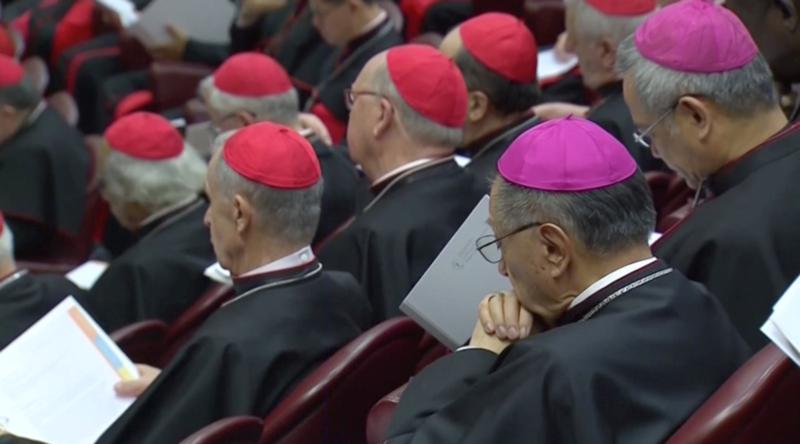By John L. Allen Jr.

ROME (Crux) – Over the years, the Vatican has demonstrated a fairly remarkable capacity from a PR point of view to snatch defeat from the jaws of victory – striving to offer the world good news about the pope and the Church, only to find a way to step on that story and turn it into something else.
One thinks, for instance, about a wave of sexual abuse scandals that swept Ireland and then much of Europe in 2009 and 2010, which actually triggered real reform in Catholicism and revealed Pope Benedict XVI as an honest-to-God change agent.
Nevertheless, that storyline was basically hijacked when Italian Cardinal Angelo Sodano, the Vatican’s former Secretary of State and Dean of the College of Cardinals, called the complaints of abuse survivors “petty gossip” during an Easter Sunday homily.
It’s still early in the game, but there have already been hints during this week’s high-profile summit on clerical sexual abuse that the Vatican may find ways to take our eyes off the prize this time too.
To begin with, despite efforts in the run-up to this gathering of presidents of bishops’ conferences from around the world to lower expectations – or, as Pope Francis himself put it, to “deflate” expectations – the Vatican certainly isn’t treating this as business as usual. They’re offering daily briefings with A-list personalities, livestreaming much of the proceedings, and issuing most materials in multiple languages.
Vatican officials are investing that much energy, obviously, because they think this is a big deal – a sign of seriousness and resolve about cleaning up the mess caused by the abuse crisis, and therefore an event that ought to put the Church in a positive light.
Yet there have also been hiccups, some of which could metastasize into real distractions.
For instance, earlier this week the Vatican Press Office issued a “media kit” for coverage of the summit, which included a timeline on the abuse scandals. When the Italian version of that kit was released electronically on Wednesday, it included a reference to the criminal conviction of a senior Church official for sexual abuse that’s actually still covered by a judicial gag order in the country in which the trial took place.
Asked about it by reporters, a flummoxed spokesperson said that the media kit couldn’t be taken as an “official position” of the Vatican – as if anyone had ever asked what the Vatican’s “position” was on a point of fact rather than Church teaching – and also insisted that the Vatican had no intention of defying the gag order, despite the fact that was self-evidently what they had just done.
Very quickly, that item was redacted in the electronic edition of the media kit, eliminating any reference to the conviction. On that front the Vatican largely managed to dodge the bullet, since no one really picked up on the brief-lived faux pas.
Seemingly more serious was a series of 21 “points of reflection” the Vatican released on Thursday, described as things Pope Francis wants the assembled bishops to think about based on input from “various episcopal commissions and conferences.”
Two points caused immediate consternation, especially among abuse survivors on hand in Rome.
One point read, “The principle of the presumption of innocence in natural and canon law must also be safeguarded until there is proof of the guilt of the accused,” recommending, therefore, against release of the names of priests accused of sexual abuse ahead of a “definitive condemnation.”
The document said it was “necessary to prevent” the publication of such lists, “even by dioceses.” If taken seriously, that could invalidate the practice in most American dioceses of releasing names when an accusation is found to be credible, even if a final verdict either hasn’t yet been reached or a legal proceeding isn’t possible.
In fairness, Pope Francis did say these were only things to think about, not intended to “detract from the creativity needed in this meeting.” In fairness, too, Archbishop Charles Scicluna of Malta, a former Vatican prosecutor on sex abuse crimes, said Thursday that in his view releasing the names of priests facing “credible” accusations is fine, as long as it’s done responsibly.
Still, the whole idea of restricting the information flow probably won’t sit well with survivors, who generally want the Church to provide more data on accused priests rather than less. For instance, survivor Peter Isley with the activist group “Ending Clergy Abuse” complained Thursday about a lack of information as to how the pope is handling roughly 4,000 cases currently awaiting judgment at the Vatican’s Congregation for the Doctrine of the Faith.
“What is he doing with them?” Isley wanted to know. “How come we don’t know who these individuals are?”
Another of the “points of reflection” concerned punishments abuser-priests ought to receive, recommending respect for “the traditional principle of proportionality of punishment with respect to the crime committed.”
To some observers, that line sounded like hesitance about defrocking all priests who sexually abuse minors, which has become more or less the standard sanction in such cases. Once again, in fairness the document also called on Church leaders to “decide that priests and bishops guilty of sexual abuse of minors leave public ministry,” but that’s not quite the same thing.
In all honesty, it’s unlikely thorny issues such as these will be taken up at this week’s summit, and it certainly is true that the very act of calling such a meeting represents a step forward – perhaps especially so for the Church in parts of the world where the abuse scandals have not yet erupted, whose bishops will at least go home with a grudging realization that they’re expected to act.
One wonders, however, if that good news story will have much traction at the end of the week, if the Vatican keeps finding other, and less flattering, narratives for enterprising journalists to pursue.
